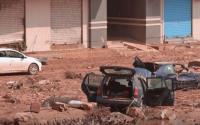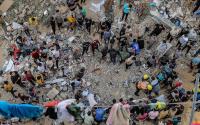The Guardian,13 December, 2001Leon Fuerth is a 61-year-old university professor: grey-haired, a bit distracted, not over-formal - the kind of guy who never attracts a second glance when he walks the streets of Washington. However, he is surprisingly new to campus life. He became a visiting professor of international affairs at George Washington University earlier this year after the job he could, would and - arguably - should have had fell through in distressing circumstances. Professor Fuerth, a member of Al Gore's staff for 20 years, had been promised the post of national security advisor, the position close to the president's ear held instead by Condoleezza Rice.
A year ago today everything crumbled away. On December 13 2000, Vice-President Gore, the nation's popular choice by more than half a million votes, conceded the election to George Bush in response to the Supreme Court's 5-4 vote to stop the recounts in Florida. If Fuerth is unnoticed, his old boss is hardly more visible: bearded, tubbier, occasionally taking trips in a hire car to sniff the air for 2004, a half-forgotten figure from a past American frenzy, like - OJ Simpson or Monica Lewinsky.
This is the American Way. When the White House changes parties, hundreds of senior officials disappear into (often well-rewarded) oblivion in the law, lobbying or academe. Fuerth refuses to bitch, certainly not in public: "Some of my friends are now attorneys. Some of them are happy, and some of them are not."
Like all the wounded Democrats, he refuses to play "what might have been" in public. The mystery of how President Gore would have dealt with September 11 must remain just that.
There is, in any case, enough mystery about what has actually happened. How has the least legitimate president of modern times become the most popular, a man who soars far above criticism to a height neither Franklin Roosevelt nor Lincoln ever achieved? How has such an inarticulate man turned into a phrase-maker who has earned excited comparisons with Churchill? How has a man excoriated as lazy even when he was campaigning managed to cope with this crisis? How, one year on, is the accidental, arguably fraudulent, president who is George Bush become master of the universe?
"I think part of it is that he has genuinely risen to the occasion," says Roger Simon, author of Divided We Stand, probably the wittiest account of the 2000 campaign but now just one of a raft of books on that forgotten crisis sitting on the bookshelves and getting less display than complex tomes on the workings of Islam.
Only a churl would refuse to acknowledge Bush's success in crafting national unity out of catastrophe, and even American liberals have been obliged to pay tribute. It was possible, back in the days when the administration was in its less pressured but less assured and more contentious phase, to observe some of the factors that have served it well over the past three months. A callow president had the sense to surround himself with people who had three great virtues.
First, they are experienced - in some cases extraordinarily so. Donald Rumsfeld and Dick Cheney were both chiefs of staff to President Ford back in the Jurassic age. Rumsfeld moved on to be defence secretary then, as he is now. Cheney held the job under the first President Bush, when Colin Powell was chairman of the joint staffs. And never forget the most experienced adviser of all: the presidential dad. These people did not emerge blinking into Washington, straight out of Georgia or Arkansas. They did not, as Clinton's team did, fritter their first week's goodwill on a diversion such as gays in the military.
Second, they actually seem to like - or at any rate respect - each other. The institutionalised loathing between the State Department and Pentagon seems under control. In fact, one reading of events is that Rumsfeld has used Powell's military expertise to help him take on the generals. But that is only one reading of events.
The third point may be the most important. No one outside the innermost recesses of the administration really knows who argues for what. Secrecy is a product of the experience and the mutual respect. These people do not blab to the press. Instead, journalists get Ari Fleischer, whose lengthy televised briefings are as opaque as a later Beckett play, but with less hard information.
Presidents need to be lucky in their enemies, though, as well as skilful in choosing their friends. Margaret Thatcher was blessed by General Galtieri and Arthur Scargill. In Osama bin Laden, Bush has a target who offers him glorious simplicity. The Afghan war had - and still has - immense technical complexities, but the tough decisions have been military ones. It has not yet involved the damned-if-I-do, damned-if-I-don't moral dilemmas that destroyed Lyndon Johnson over Vietnam and Jimmy Carter over Iran. It has thus been a perfect exercise for a man who advertised in advance the fact that he saw himself more as chairman of the board than a traditional chief executive.
"It's not a great intellectual exercise he's engaged in," says Roger Simon. "He's not arguing a case in a debate. The arguments are very simple in his mind: good v evil. He tends to be pretty good at expressing that sort of thing." Occasionally - very occasionally of late - there are moments when a question pierces the president's political armour and scores a direct hit on his ignorance or crassness. A high school kid did it in Texas last month with a complex question about nuclear deployment; an eight-year-old did it in Florida last week, bringing forth a baffling case of what appeared to be false-memory syndrome about Bush's first response to the attacks. Ronald Reagan used to shrug these lapses off; these days they hardly get reported.
Though we hear less about his long sleeps, there are few signs that the president - thoroughly un-American in this regard - has become a workaholic. It is as though he has to be revved up and wheeled out to fulfil each role. He attends a high-level morning meeting involving the crucial figures in his inner circle, but evidently not the evening equivalent. He neither knows nor cares about details. This is not Churchillian; it is not even Clintonian.
There also seems to have been a firm policy decision that the president should be associated only with good news, and he was notably low profile - making speeches about jobs in Pennsylvania and so on - early last month when the war was progressing fitfully. It is a presidential style familiar from the Reagan era, except for one huge difference, according to the Brookings Institution scholar, Ivo Daalder. "Reagan's foreign policy stalled for years because state and defence were locked in endless disputes, and he couldn't adjudicate between them. Bush can make a decision and move on."
Indeed, Bush said last week he had not regretted a single thing he had done in the past three months, a record few of us can manage. But this is a man who executed 152 people as governor of Texas (some of them admittedly guilty) and never lost a moment's sleep. Broad-brush presidents are often held in contempt, especially by the political left. The approach has its virtues as a way of governing America. "My personal view is that complexity in a leader is not a helpful thing," Roy Blunt, a loyalist Republican Congressman said last week, "and certainly not a helpful thing in a crisis."
There are those who still insist that Bush is an empty shell and that the crucial decisions are taken by Cheney. This does not really add up. And the low profile Cheney has been obliged to adopt since September 11 may have had less to do with security than with making it clear to the public that the president is in charge. And if, as officialdom insists, he now spends most of his time away from the president, then his influence is almost certainly declining. Telephones and video links are no substitute for the telling word in his ear: "Location, location, location," as one former White House aide puts it.
There is another substantial difference between Bush and Reagan. "It's not an ideological administration in the way that Reagan's was," says Peter Beinart, editor of the soft-left magazine The New Republic. "Bush is only ideologically motivated when it comes to reducing tax and regulation. When it comes to other matters, these people are politicians not ideologues. They split the difference on issues like stem cell research. They've given up on abortion.
"They've essentially ratified affirmative action. They're looking high and low for Hispanics they can bring into the administration and the Republican party. The Republicans learned in the 1990s that if you look hostile to blacks, it will hurt you with white women." Bush can hardly look hostile to black people - no administration in history has had two, Powell and Rice, among its five most influential figures. And one of the impressive feats of management has been the way the president wrapped the Arab-American community inside the flag from the start of the crisis, and kept them there.
It's all a paradox because the fundamentals did not disappear on September 11. This remains an administration drawn from the furthest reaches of the American right. As a congressman, Cheney opposed the release of Nelson Mandela and even the Endangered Species Act. John Ashcroft, the attorney-general, was considered so far-out that his old senatorial colleagues almost refused to confirm him.
Perhaps it's more accurate to conclude that this is an ideological presidency, but not in any driven sense. In the past three months, the other issues have not gone away - missile defence; tax cuts for business and for the rich; oil drilling in Alaska; the opposition to Kyoto; indifference to other countries' concerns in general. The suspension of politics as usual has just made them easier to implement. The congressional Democrats, far from being emboldened to point out the futility of a nuclear shield, quietly dropped their opposition within a fortnight of the attacks.
And, behind it all, the Bush team really does believe it knows best. You can often sense the president's inability to come to grips with anyone else's opinions through the wafts of mutual admiration that get expressed after he meets whichever world leader has to come pay homage. Karl Rove, the president's political adviser, said on Tuesday - in a rare public appearance, that Bush was exactly the president he was before it all. That's true, though not necessarily in the way Rove meant. All the coalition-building, all the buddy-buddy stuff with Tony and Vladimir, have failed to disguise the fact that Bush is fighting America's war, and he prefers acolytes to allies. You can sense it in every speech he makes - the boilerplate references are to America and its virtues. Other presidents sought to use such moments to embrace the world.
This is, perforce, not an isolationist country, but its rulers are just as strikingly unilateralist now as they were three months ago. No one here outside the employ of the State Department is bothered by this: the administration has a keen ear for the Middle West but a tin ear for the Middle East.
What's strange is that few of its underlying objectives are being pursued with any urgency. Rove also said that on domestic matters, Bush had more or less instructed his team to get on with it. As with the slipshod staffwork that allowed Senator Jim Jeffords to defect, and give control of the Senate to the Democrats, the whole White House can appear curiously disengaged. Bush, like most Republicans, opposed the idea of federalising - nationalising - airport security as a response to the disasters but simply told Congress to agree on a plan and he would sign it. It did agree: security is to be federalised.
And yes, his team is now arguing for huge corporate tax cuts - but apparently not loudly enough to overcome the opposition. Over the secret military tribunals (which cause louder opposition in Europe than here) one senses an underlying pragmatism and that they are being set up to prevent a possible trial of bin Laden or someone of that status turning into a Simpsonesque circus.
There has also been a strange solipsism in response to the attacks. No senior politician has been killed, just a lot of ordinary people. Yet we are constantly told about the terrible danger the president faces. His initial scuttle to Nebraska (and the absurd spin that Air Force One was threatened) was not exactly a profile in courage. Since then, the security measures around federal buildings, which increasingly resemble armed camps, have not been matched by the piecemeal improvements in national security. Cheney may be in a cave somewhere for his own protection; the risk to everyone else seems a secondary priority. There has been not a breath of public criticism for this. Yet.
Ivo Daalder is one of the few people who can even begin to see the makings of a problem. "There's a sense of yearning out there to do something for the country, a yearning that it isn't jingoistic. Bush doesn't get that. He has painted a picture of a war that's going to last years if not decades, that will ask sacrifices of our soldiers but not from the people. He hasn't painted any kind of vision. All he's asked anyone to do is shop." The New York Times columnist Thomas Friedman touched the same theme in Sunday's paper: "President Bush is intent on stapling his narrow, hard-right September 10 agenda on to the September 12 world, and that is his and our loss."
Perhaps we can understand Bush and co if we try to understand why they are there. Would the president even have gone after the job - still less got it - had it not been the family business? Are Cheney, Rumsfeld, Powell and the gang in office because they are desperate to achieve anything or because government and command happens to be their trade? September 11 gave this administration a sense of purpose. It hardly had one before, except that governing America beats governing Texas. And it certainly beats the hell out of teaching international relations.






